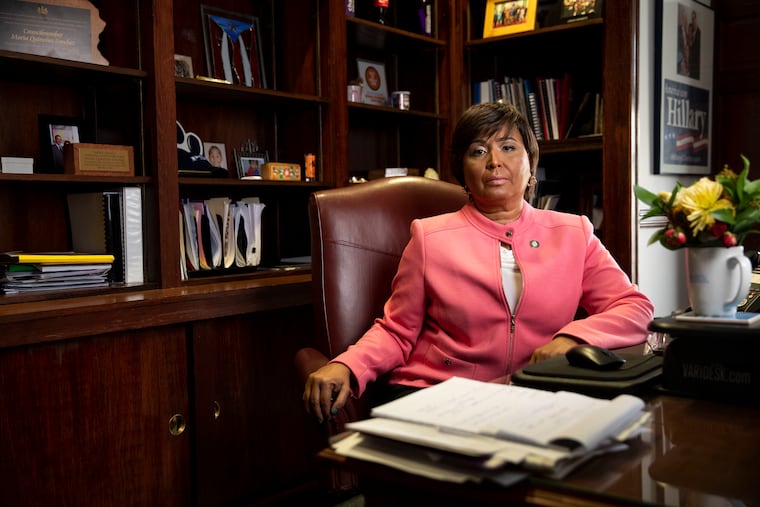Philly Councilmember Maria Quiñones-Sánchez announces she has breast cancer
Quiñones-Sánchez, who is rumored to be eyeing the 2023 mayoral race, said that she is now cancer-free following a successful mastectomy in August, but will undergo preventive treatment.

Philadelphia City Councilmember Maria Quiñones-Sánchez announced on Saturday that she was diagnosed with breast cancer this summer.
Quiñones-Sánchez, who represents the Kensington-based 7th District and is rumored to be eyeing the 2023 mayoral race, said she is now cancer-free following a successful mastectomy in August, and will be undergoing preventive chemotherapy and radiation through December.
Revealing her condition in an Inquirer op-ed, Quiñones-Sánchez, 52, said she went public to encourage others to get regular breast-cancer screenings.
“Both Black women and Latinas in Philadelphia are more likely than white women to have difficulties accessing health care and insurance, making it harder for them to get the preventive testing that could save their lives,” she wrote in the op-ed. “Because of my own experience, I’ve learned that regular screening is absolutely vital to detecting and treating this disease.”
Quiñones-Sánchez said she had not had a mammogram in seven years.
“Like many others, I had put off my screenings because of work and life — and then COVID-19 gave me another excuse not to go to the doctor,” she wrote. “But this year, I promised my husband that once the City Council’s budget process was over in June, I would schedule my appointments.
“I knew going into my mammogram that I had a small lump in my breast, but because it had never been painful, I put off getting screened. After the mammogram, I immediately had an ultrasound and a few days later, a biopsy confirmed my cancer. I was so mad at myself for waiting so long to have the lump checked out.”
Quiñones-Sánchez said she was also inspired to come forward by the memory of Gloria Casarez, a champion of LGBTQ rights in Philadelphia who died of breast cancer in 2014, and by hearing other women tell their stories during Breast Cancer Awareness Month, which is October.
Born in Puerto Rico, Quiñones-Sánchez moved to Philadelphia when she was 6 months old. She was raised by her mother, Bienvenida, and lived for a time in public housing.
Mayor Jim Kenney and colleagues in City Council sent out public messages of support. On Twitter, Council President Darrell Clarke wrote: “My friend is a fighter.”
Thank you to my friend and colleague @MariaQSanchez for courageously sharing your story and encouraging others to take advantage of early screening and detection. Wishing you a smooth and speedy recovery journey. https://t.co/qRcsY9pzPD
— Jim #VaxUpPhilly Kenney (@PhillyMayor) October 30, 2021
Kenney thanked her “for courageously sharing your story” and encouraging others to seek early screening and detection.
Sanchez attended Temple University and got a job in the office of legendary Councilmember Marian Tasco, a leader of the Northwest Coalition political organization who launched the careers of several prominent women in Philadelphia politics.
Quiñones-Sánchez later worked for the city commissioners, earned degrees from Lincoln University, and was a staffer for Councilmember Angel Ortiz, the first Latino to serve in the body. Quiñones-Sánchez led the educational nonprofit ASPIRA and founded the Eugenio Maria de Hostos Charter School. She has been active in efforts to protect Latino voting rights.
First elected to Council in 2007, Quiñones-Sánchez has won every race she’s run in despite fighting against her own party, as Democratic ward leaders and heavyweights have backed opponents in each of her three reelection campaigns.
A consummate outsider and a frequent antagonist of Kenney, Quiñones-Sánchez is widely viewed as a likely candidate to succeed him.
In her op-ed, Quiñones-Sánchez gave no indication that her fight against cancer will slow her down.
“My promise to the women of Philadelphia is that I will be a strong advocate for wider screening options, more access to screening, and getting women of color more engaged in their health options,” she wrote. “This is what the brave women I represent deserve and expect me to do.”
Physicians such as Elizabeth Revesz, a breast surgeon at Virtua Hospital, said many women are busy taking care of their family members’ health care and forget their own. She’s affiliated with the Penn Medicine | Virtua Cancer Program, and is not treating the councilwoman.
“Don’t beat yourself up if you forget to get screened one year, or more than one year. Just come back and do it,” she said. Revesz said many hospitals and surgeons see a spike in screenings in October “because it’s Breast Cancer Awareness month, and women begin calling us.”
How to get a free or low-cost mammogram
Mammograms and other breast-cancer screenings dropped sharply after the pandemic began.
Early results from the University of Wisconsin Cancer Intervention and Surveillance Modeling Network breast cancer model estimate that a 75% reduction in screening over six months coupled with a six-month delay in diagnosis for one-third of women with a positive screening mammogram or clinical symptoms would result in more than 5,000 extra breast-cancer deaths — a 1% increase — in the United States between 2020 and 2030. That’s according to Breastcancer.org, a nonprofit based outside of Philadelphia.
To find out if you qualify for a free or low-cost mammogram and Pap test and where to get screened, visit or call:
800-848-3367 in Philadelphia, Chester, Delaware, Montgomery, and Bucks Counties; others call 800-215-7494.
Speak with your doctor or health-care provider to order a preventive screening, which should be covered by insurance.
Visit the Pennsylvania Department of Health website for PA Breast and Cervical Cancer Early Detection Program: health.pa.gov